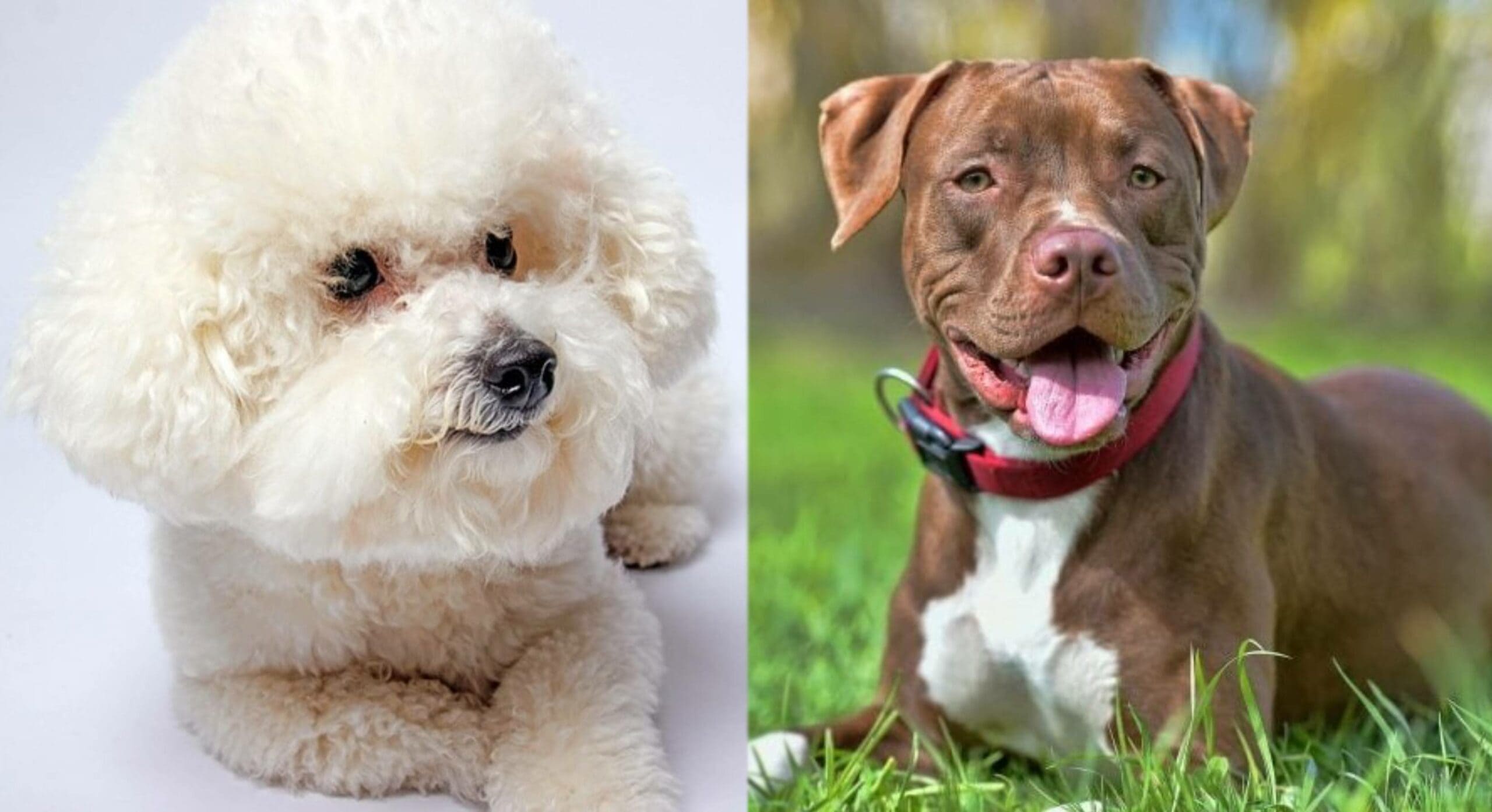Boxmas (Mastiff & Boxer Mix): Info, Pictures, Facts

Updated on
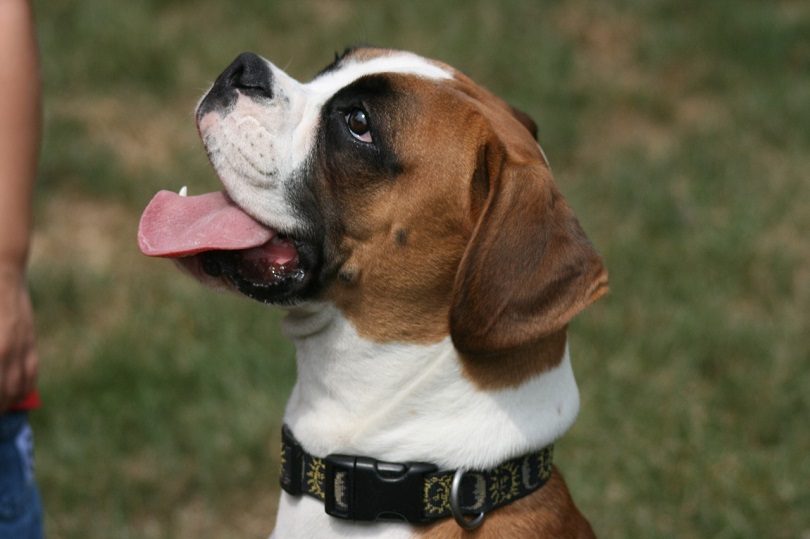
| Height: | 21–36 inches |
| Weight: | 65–170 pounds |
| Lifespan: | 6–12 years |
| Colors: | Almost any color, including brindle and fawn |
| Suitable for: | Active families looking for a large dog with plenty of character |
| Temperament: | Friendly, active, and good-natured; can have a protective streak if not carefully trained |
If you’re looking for a large dog full of character, we’d like to introduce you to the Boxmas. With an appearance almost as sweet as their name, they are a mixed breed that combines the Boxer and the Mastiff to create an active and fun-loving dog. While these big dogs certainly do have a gentle streak when it comes to spending time with their families, they also have protective instincts that will kick into action if they feel that any of their loved ones are in danger.
That means that early training, including plenty of socialization, is vital if you want your Boxmas to be polite and respectful of strangers. The Boxmas is a relatively new mixed breed, and as a result, you might not know that much about them. In this guide, we’ll tell you all you need to know about these remarkable dogs.
Boxmas Puppies
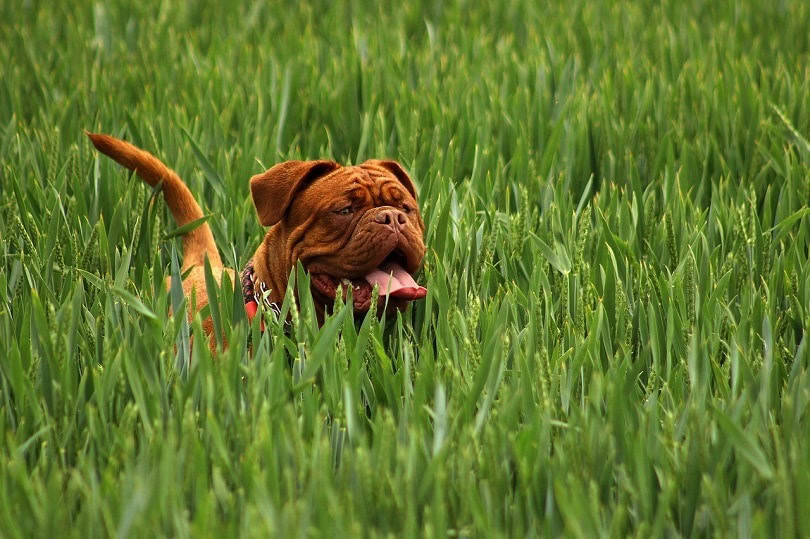
It’s almost impossible to visit a litter of puppies and not be tempted to take at least one home with you. But before you make that commitment, it’s essential to consider whether you can provide everything that a puppy needs to thrive and grow into a well-mannered adult dog.
The Boxer and the Mastiff breeds were historically used as protectors or guardians. Boxer puppies are likely to inherit this instinct to protect and guard their families. While that might seem cute when they’re small, it’s a slightly less endearing prospect when your visitors are faced with a dog who weighs up to 170 pounds or more.
It’s vital to ensure Boxmas puppies receive training and socialization when they’re still small. This will help them grow into well-rounded and obedient adult dogs. Boxmas puppies also have almost endless supplies of energy, which you’ll need to help them use up with plenty of exercise.
Their large size can strain their growing joints, and you have to limit the intensity of their exercise sessions to prevent injuries when they’re puppies. That means shorter walks, no jumping from heights, and feeding a specific dog food designed for larger breeds.
3 Little-Known Facts About the Boxmas
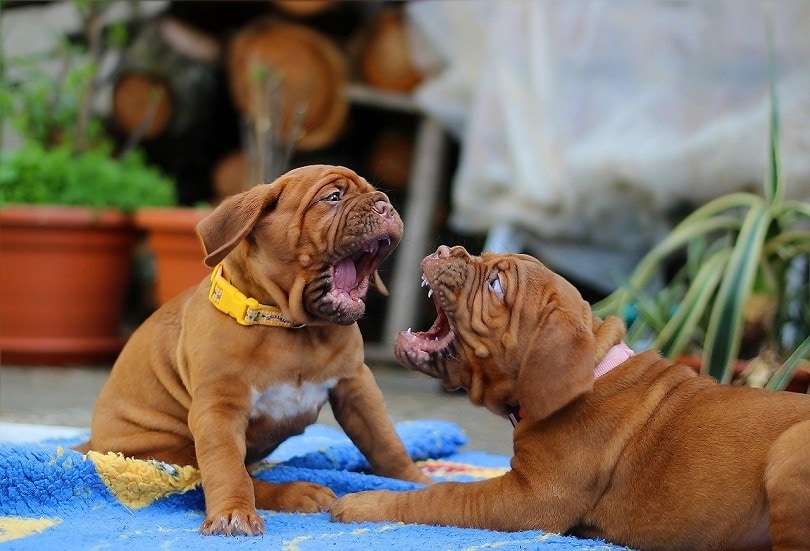
1. Boxers and Mastiffs Both Served as War Dogs
The Boxer’s origins lie in Germany, where they became popular in the 1800s as a versatile breed. They excelled as cattle dogs, watchdogs, police dogs, and guide dogs, as well as serving as war dogs in both world wars. They now frequently rank in the Top 10 of America’s favorite dogs.
Mastiff-type breeds have been around for centuries. The Old English Mastiff, frequently called the “Mastiff,” was used in medieval England as a watchdog, hunter, and war dog. After the Second World War, it was thought that there were only 14 Mastiffs left in the entire United Kingdom. Luckily, U.S. breeders exported several dogs and began a breeding program to increase their numbers.
2. Boxmas Dogs Are Extremely Protective of Their Families
Thanks to the fact that the Mastiff and the Boxer have been bred to protect their families, Boxmas puppies are likely to inherit the same trait. While they might be patient and kind with their families, they won’t hesitate to act if they think a stranger or other dog is threatening you.
That’s why it’s essential to start training and socializing your Boxmas puppy as early as possible. Without these training sessions, their protective instinct can soon turn into aggression. You’ll need to be prepared to spend a significant amount of time making sure your large Boxmas knows how to interact safely with humans and other dogs.
3. Hybrid breeds are often healthier than their pedigree counterparts
While some dog owners are firm believers in purebred breeds, there’s an argument for mixed breeds, or hybrids, too. The increased genetic diversity of mixed breeds can mean that they’re often healthier than their purebred counterparts.
The scientific term for this is “hybrid vigor.” This means that hopefully, your mixed breed Boxmas should be less likely to suffer from inherited health conditions that can result in costly veterinarian bills.
On the flip side, when it comes to mixed breeds, it can be harder to predict particular characteristics of these hybrids in terms of size, appearance, and temperament. Puppies can inherit what seems to be a fairly even mix of both their parent’s traits or end up much more like one than the other. This does mean that it’s a good idea to be prepared for your mixed breed puppy to end up with a wider range of possible characteristics than a purebred dog. As long as you love both the parent breeds, you won’t be disappointed with how your puppy turns out!
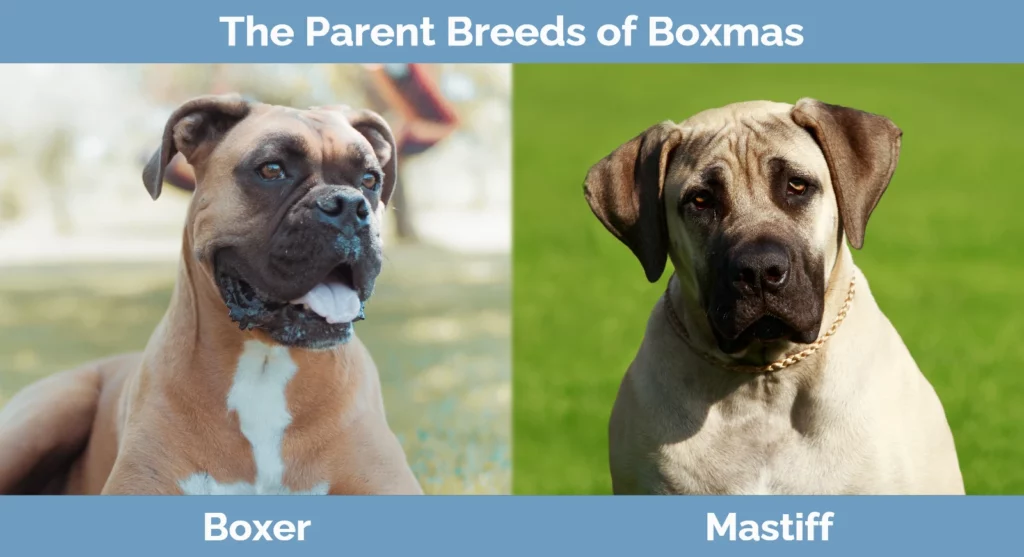
Temperament & Intelligence of the Boxmas 🧠
Boxmas dogs are fun-loving with a streak of silliness, thanks to their Boxer parentage. While they are a large breed, they’re playful too, so you can look forward to plenty of play sessions in the back yard. Their size and weight make them tire themselves out quicker than smaller, more energetic breeds. This gives them a nice balance between activity and rest. After playing or a walk, they’ll be happy to curl up and rest for a few hours.
However, that’s not to say they still won’t be keeping one eye on their families. Although sweet and gentle around their families, they always want to ensure their owners are safe. This can become an issue if they don’t receive enough training and socialization when they’re young. The Boxer Mastiff cross is intelligent and will enjoy regular training sessions to keep them mentally and physically exercised.
While you need to be careful of too much high-intensity activity as your pup is growing up, there are plenty of games you can play to challenge them mentally. Try food puzzles and low-intensity trick training to keep your gentle yet bright dog’s brain fully engaged. Boxmas dogs won’t mind being left alone throughout the day if they’ve had plenty of exercise first.
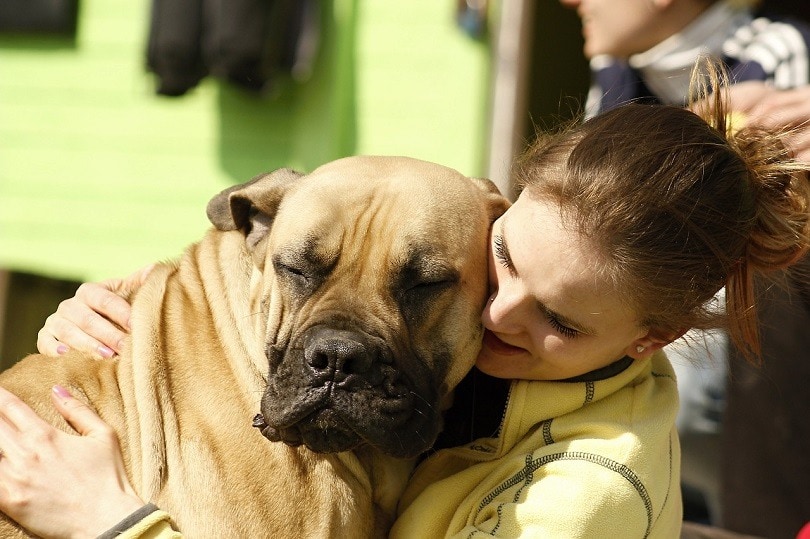
Are These Dogs Good for Families? 🏡
Boxmas dogs make fantastic family pets if you remember a few crucial points. Their kind and loving nature makes them suitable for life with children, but their large size and sometimes excitable nature means they can knock small children over! The dog would not do it on purpose, but it’s something to watch during play sessions.
You need to do a fair amount of training to make sure that family and friends are accepted into your home with the minimum of fuss. While you might feel confident around your large-breed Boxmas, remember that their size and stature can make them look intimidating to visitors.
Make sure your Boxmas knows not to jump on people. They’ll also need to be well-socialized as puppies so they don’t become overprotective of their families to the point that visitors feel unwelcome!
Does This Breed Get Along With Other Pets? 🐶 😽
The Boxmas gets along well with other pets. However, Boxers sometimes become nervous around other dogs of the same sex, which could be a trait your Boxmas displays. This nervousness can sometimes manifest as aggression if introductions aren’t managed correctly.
Always make sure to introduce new pets to each other slowly and in a controlled environment. Keep the initial meetings short and sweet, and allow each pet somewhere safe to retreat if they feel the need.
Things to Know When Owning a Boxmas:
Deciding to add a Boxmas to your family is a big decision and requires time and money. Before you make up your mind, here are a few more things you should know about this breed first.
Food & Diet Requirements 🦴
Because your Boxmas puppy has the potential to grow to a large size, you should select a high-quality puppy food that has been specifically designed for giant breeds. It will have the correct levels of calcium and phosphorous to ensure that their bones grow correctly. It will also have a lower percentage of protein, fat, and calories than foods designed for smaller breed puppies.
This is important because you don’t want your Boxmas puppy to grow too quickly, which can strain their developing joints. Your puppy’s breeder should be able to advise you on a suitable brand. It’s also a good idea to maintain a regular schedule of puppy checks with your veterinarian, who can advise you if your puppy is developing as expected.
Exercise 🐕
Boxmas pups are energetic and need at least an hour of daily exercise. They need plenty of room to run, and it’s best to have a fenced-in yard where they can play safely. Although they’re not ideal for apartments, you can take your Boxmas for long hikes and allow them to participate in agility courses to burn off their energy.
Training 🦮
If you’re not prepared to put in much time training your Boxmas, this isn’t the breed for you. Your puppy will likely inherit both parent breeds’ work ethic and intelligence. They’ll soon get bored if you don’t keep their brains busy. Boredom sometimes leads to destructive habits, which none of us want to face!
Almost more important is the fact that it’s essential to train and socialize your Boxmas at a young age. Their natural propensity to guard can easily roll over into aggression if not appropriately managed. They must be trained enough to allow friends and relatives to visit without your dog feeling the need to protect their family.
Puppy training classes are an excellent way to socialize your puppy while having a professional trainer on hand to help with any specific goals you may have.
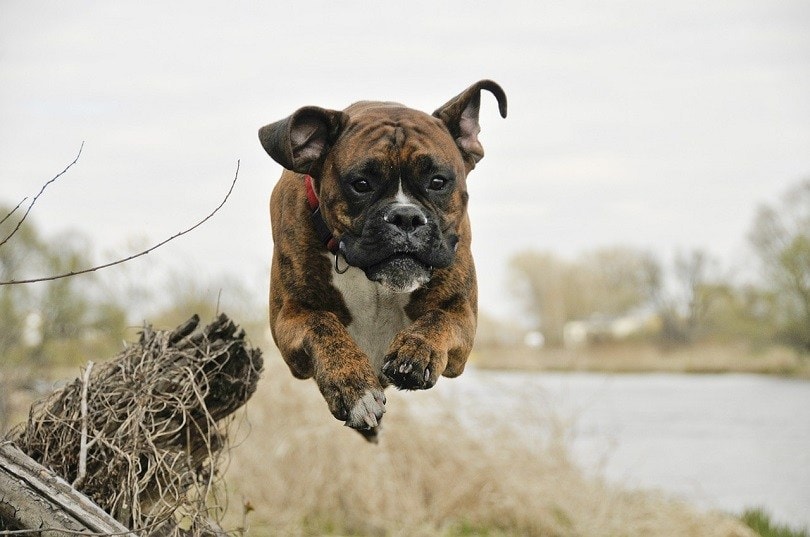
Boxers and Mastiffs can get easily bored and switch off from training sessions, so you must keep the training short and sweet. Praise and positive reinforcement are excellent tools for Boxmas owners. Despite the Mastiff’s colossal size, they are sensitive souls, and your Boxmas puppy might pick up this trait. Raised voices during training can worry a Mastiff and may cause them to become disengaged.
- We reviewed the best puppy training treats: check out our top picks here!
Grooming ✂️
The good news is that the short coat of the Boxmas will be easy to groom. Weekly brushing should be enough to keep them looking healthy. When they shed, which will be twice a year, you can increase your grooming sessions to help remove any dead hair.
If your Boxmas puppy inherits a more Mastiff-shaped head from one of their parents, you might need to deal with drool! Mastiffs are notorious droolers who love to stand close to you while they do so!
It’s a good idea to check your dog’s ears and teeth every time you groom them, and you should brush their teeth weekly. You can also check their nails, but they should only be trimmed once a month.
- See Also: 11 Best Dry Dog Shampoos
Health and Conditions ❤️
As mentioned, hybrid or mixed breeds are sometimes healthier than their pedigree mates. Luckily, in the case of the Boxmas, that is also true. The parent breeds can suffer from a few conditions that may be passed onto their pups, so it’s worth being aware of them just in case.
- Thyroid deficiency
- Eye problems
- Brachycephalic syndrome
- Hip dysplasia
- Kidney disease
- Degenerative myelopathy
- Heart disease
- Elbow dysplasia
- Cystinuria
- Wobbler syndrome
Male vs. Female
Male Boxmas dogs are larger and can be more receptive to training, and females are a bit more independent. However, the behavioral differences are anecdotal and aren’t necessarily linked to their sex. You might have heard that male dogs are more loyal, only to discover that your pup is the exception to the rule.
Therefore, it makes sense to visit the litter of puppies you’re interested in with an open mind. While you might have the idea that you want a male puppy, perhaps a female will charm her way into your heart instead.
Something to remember is that Boxers of either sex don’t always get along well with other dogs of the same sex. While your puppy might not inherit this trait, there’s always a chance they might. So, if you already have a female dog, choosing a male puppy is probably a good idea, and vice versa. Some hormonal traits are reduced or eliminated when your puppy is spayed or neutered.
Final Thoughts
It’s fair to say that the Boxmas isn’t as well known as some of the other hybrid breeds out there, but they have so much going for them! A combination of intelligence, loyalty, and a sense of fun makes them the perfect companions for active families.
Be prepared to spend plenty of time and effort socializing and training your Boxmas to ensure their protective streak doesn’t go into overdrive. They’ll also need an above-average amount of exercise to keep them happy, but it needs to be split into short sessions so they don’t get tired.
Their dedication to their family and gentle protective nature sets the Boxmas apart from many other breeds. If you can give them the combination of love and guidance that they require, you’ll be paid back a thousandfold.
See Also:
- Boxapoint (Boxer & German Shorthaired Pointer): Info, Pictures, Characteristics & Facts
- Boxer Basset (Boxer & Basset Hound Mix): Info, Pictures, Traits
Featured image credit: artbycharlotte, Pixabay







